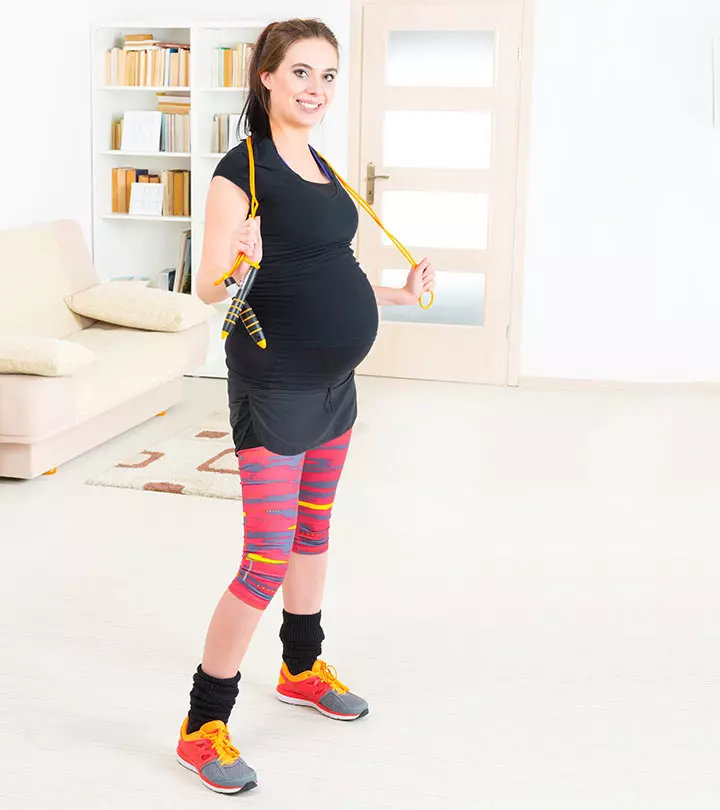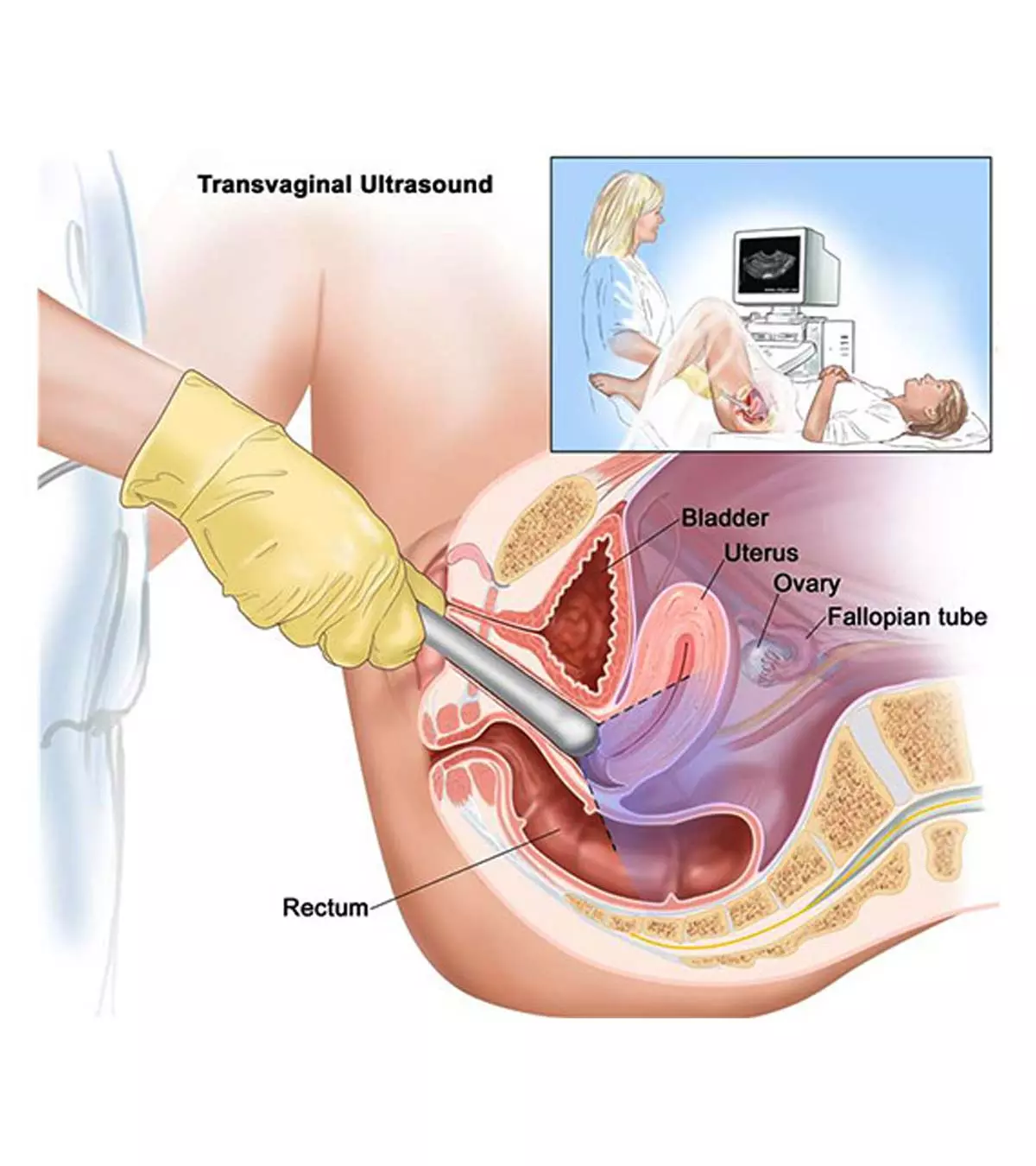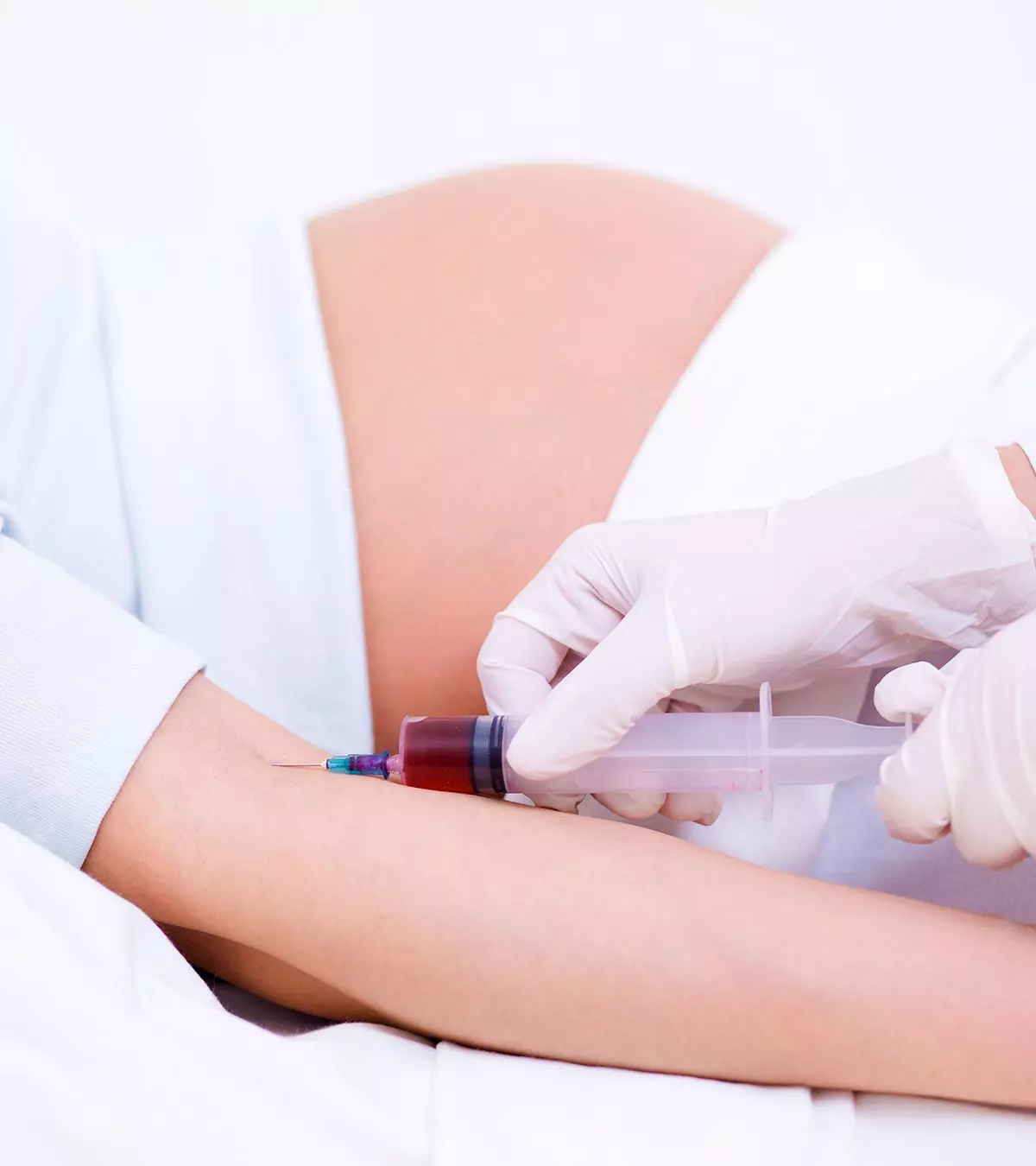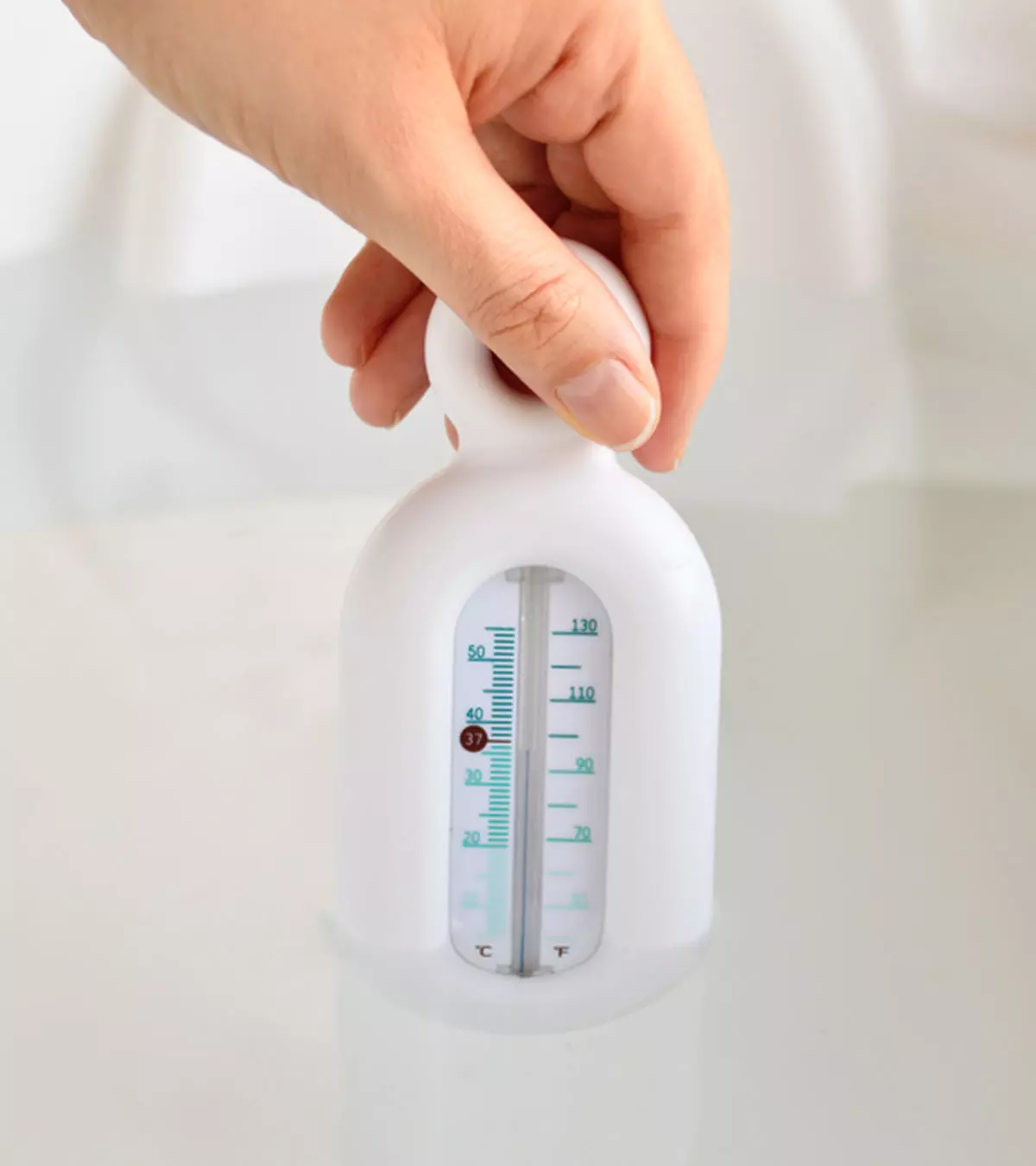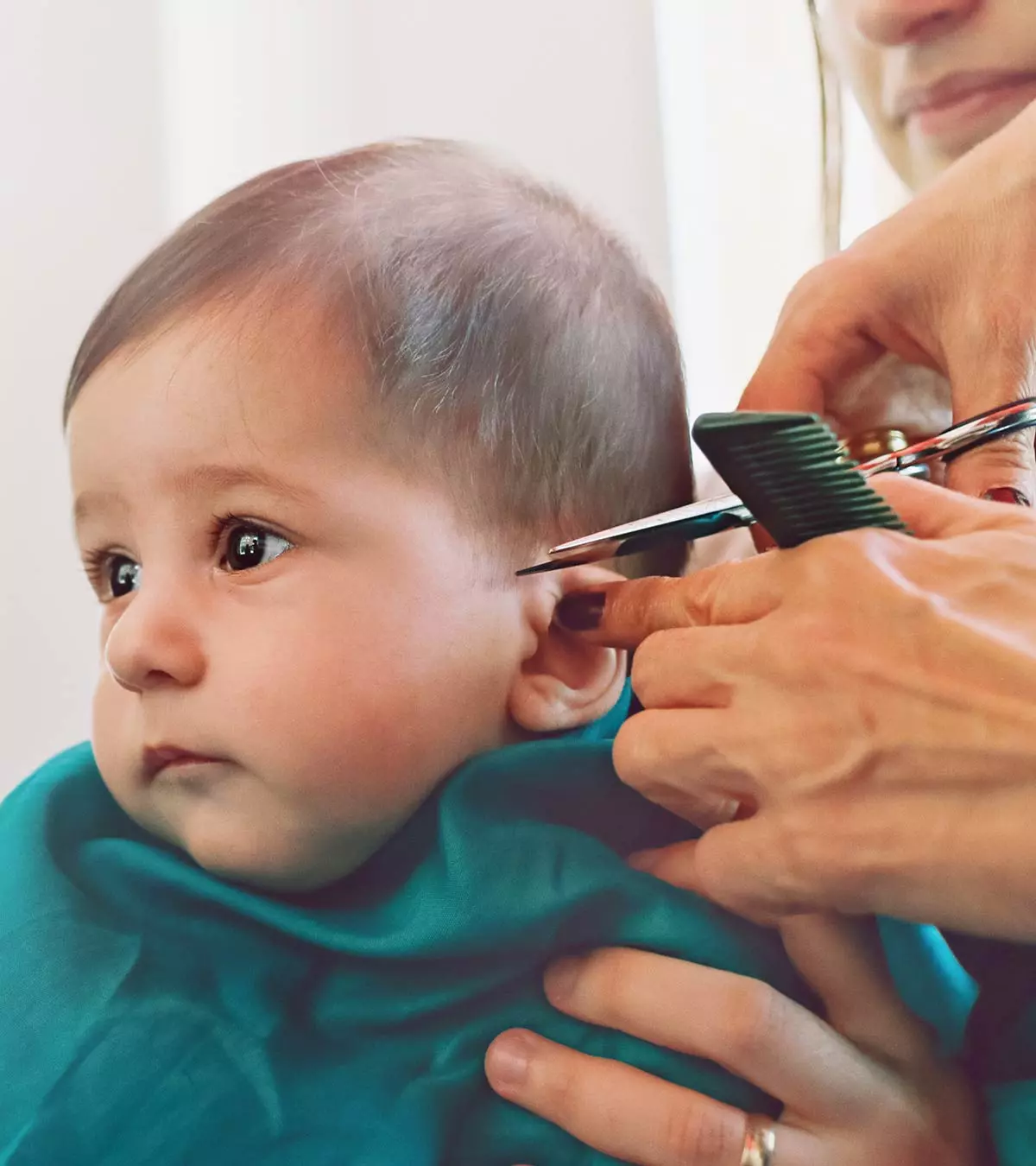
Image: Shutterstock
Neck pain or shoulder pain during pregnancy is usually known as referred pain, one that originates from some other parts of the body and not where you feel it. Such pain can be caused by various reasons, including increased pregnancy weight, hormonal and physiological changes, and incorrect posture.

The piercing pain can cause discomfort and also affect your daily activities. Researchers from the Norwegian Institute of Public Health highlighted that musculoskeletal pains, including shoulder pain, may increase sickness absence among pregnant women (1).
Understanding shoulder pain during pregnancy is crucial as it can not only impact the quality of life but may also indicate underlying health issues that need immediate attention. Recognizing the signs and symptoms can help expectant mothers take proactive measures and seek timely medical advice when necessary. Read on to learn more about shoulder pain, including its causes, treatment, and preventative measures.
Key Pointers
- Pregnancy-related shoulder pain is referred pain, meaning it comes from another area of the body.
- Weight increase, physiological and hormonal changes, poor posture, ectopic pregnancies, gallstones, preeclampsia can all contribute to shoulder pain during pregnancy.
- Symptoms of shoulder pain during pregnancy may include dull pain, radiating pain to the cervical region, and a sore shoulder in the first trimester associated with nausea and other symptoms.
- Taking preventative measures entails keeping an appropriate posture and avoiding activities that could result in a sharp strain on the muscles.
What Are The Causes Of Shoulder Pain During Pregnancy?
Shoulder pain could be due to a problem in the shoulder region (such as shoulder-joint pain). Or it could be a symptom of an underlying condition or injury to another part of the body.
Dr. Alan R. Lindemann, MD, MS, an obstetrician and a former clinical associate professor at the University of North Dakota, says, “With preeclampsia, eclampsia, HELLP syndromeiA rare, serious complication of high blood pressure during pregnancy (hemolysis elevated liver functions and low platelets), hepatitis, gallbladder trouble, gallstones, ruptured liver capsule, and pancreatitis, the right shoulder is more likely to hurt. If you have pain in your right shoulder but it is not sore to touch, this pain requires immediate attention from a healthcare provider.”
Some of the possible causes of shoulder pain are:
- Ectopic or tubal pregnancy: Shoulder pain in the early stages of pregnancy could be a sign of ectopic/tubal pregnancy (2). Ectopic pregnancy is a pregnancy located outside the uterus or in the fallopian tubesiA part of the female reproductive system that carries eggs from the ovaries to the uterus. and might cause a sharp and stabbing pain associated with cramping.
Hormonal fluctuations during pregnancy can lead to muscle relaxation and changes in body mechanics, contributing to discomfort or pain in the shoulder region. These changes may exacerbate existing conditions or create new sources of pain.
The pain originates in the abdomen and may radiate to the tip of the shoulder (1); this is associated with internal bleeding (3). Ectopic pregnancy is a life-threatening condition and requires immediate medical attention (4).
“Shoulder pain on one or both sides can be associated with bleeding in your abdomen from a ruptured ectopic pregnancy. Shoulder pain is a hallmark of diaphragmiA muscle under the lungs that helps with breathing. irritation whether it’s from bleeding or infection,” adds Dr. Lindemann.
- Hormonal fluctuations: Changes in hormone levels during pregnancy can lead to muscle relaxation and changes in body mechanics (5). It may contribute to discomfort or pain in the shoulder region. These changes may exacerbate existing conditions or create new sources of pain.
- Gallstones: Fatty meals trigger the release of a hormone that could give rise to deposits of calcium and cholesterol in the gallbladderiA small organ that stores bile, a fluid that aids in digesting fats. . The deposits pass through the bile duct and could become an obstruction, causing a sharp and piercing pain in the abdomen that may later radiate towards the right shoulder or the back (6).
- Weight gain and posture change: Increasing body weight and an imbalanced posture may increase the risk of shoulder pain (7). The stretching abdominal muscles, prolonged wrong posture, or sudden pull in the muscles might also spread the pain to the shoulders.
- Sleep: During the second and third trimesters, you are advised to sleep on your left side for improved blood circulation. But that could stress the left shoulder and may cause pain. Besides the sleeping posture, sleep itself may play a role in managing musculoskeletal pain (8).

- Preeclampsia: Characterized by high blood pressure and protein levels in the urine, preeclampsia could also cause right shoulder pain, likely to radiate from the liver, situated under the right ribs (9). Other symptoms of preeclampsia include swelling of the face or hands, sudden weight gain, persistent headaches, vision changes, sensitivity to light, nausea and vomiting, and shortness of breath or difficulty breathing (10). According to the US Centres for Disease Control and Prevention (CDC), preeclampsia is estimated to affect five and seven percent of all pregnancies (11).
- Splenic artery aneurysm: This is a rare but serious condition where the splenic artery, which supplies blood to the spleen, develops a weak, bulging area. It can sometimes occur during pregnancy due to hormonal changes, increased blood flow, or higher pressure on blood vessels. A splenic artery aneurysm can lead to sharp abdominal pain, often felt in the upper abdomen or the left upper side. Additionally, it may cause referred pain to the tip of the left shoulder. This condition is hazardous during pregnancy as it poses risks to both the mother and baby (12).
 Be watchful
Be watchful- Parsonage-Turner Syndrome (PTS): Also known as brachial neuritis, this is a rare condition that can cause severe shoulder pain during pregnancy. The condition affects the nerves in the spine, neck, and arms, often presenting with sudden and intense shoulder pain that lasts for days to weeks, followed by muscle weakness in the affected area. Studies suggest that immune system changes, such as during pregnancy, can trigger brachial neuritis (13).
- Other causes:
- Sometimes, shoulder pain could be due to ulcers or digestion problems (such as bloating, constipation and flatulenceiThe process of passing out gas from the digestive system through the back passage , or ulcers)(14).
- Mental strain, migraines, and tension headaches may result in stiffness and tension in the body, causing pain that might originate in the upper back and move towards the shoulders (15).
- In rare cases, right shoulder pain may be due to laparoscopyiA surgical procedure performed in the abdomen or pelvis without making large incisions in the skin done for an ovarian cyst or any other gynecological procedure (16).
Read on to know more about the symptoms of shoulder pain.
The graph below highlights different sites of musculoskeletal discomfort commonly experienced by pregnant women. As the chart depicts, expectant mothers experience musculoskeletal pain, including neck, shoulder, and elbow pain, more frequently during the third trimester compared to the first and second trimesters. Also, the lower back, hand and wrist, and foot are the most common sites affected by pain during pregnancy.

The distribution of common pain areas during pregnancy
Source: Musculoskeletal pain and symptoms in pregnancy: a descriptive study; Therapeutic Advances in Musculoskeletal diseaseSymptoms Of Shoulder Pain During Pregnancy

Shoulder pain itself is a symptom of certain ailments and might occur in conjunction with other symptoms.
- A dull pain like a sprain develops with muscle stiffness, or with changes in sleeping posture or hormonal changes.
- Pain radiating to the cervical region, associated with a burning sensation in the eyes, develops with fatigue and tension.
- A sore shoulder in the first trimester could be associated with nausea, vomiting, fainting, migraine, and low blood pressure writes Denise Tiran in the book Reflexology in Pregnancy and Childbirth.
- Other symptoms that may present alongside shoulder pain include tingling in the arms or hands, fatigue, and headaches, which can significantly affect daily activities and overall well-being during pregnancy (17).
 Quick fact
Quick factAny of these symptoms might be a cause for concern, and it is good to discuss them with your doctor. Additionally, keep track of any changes in pain intensity or new symptoms, as they can provide valuable information to your healthcare provider regarding your condition.
How To Deal With Shoulder Pain During Pregnancy?

Since the use of painkillers is not advisable for pregnant women, here are a few natural ways you may try to manage shoulder pain (18) (19):
- Apply a cold compress or try ice therapy at the site of pain.
- Sleep on your back with a pillow propped underneath the right side.
- Get proper rest throughout the day, and stay calm to ward off stress and tension.
- Perform mild stretching exercises under the supervision of an instructor.
- Drink plenty of water to hydrate yourself.
- Take the help of a dietitian to follow a healthy and balanced diet.
- Consider seeking chiropractic care, massage therapy, or exercise to alleviate the discomfort.
- Physical therapy, such as yoga, swimming, acupressureiThe application of pressure on specific body parts to control symptoms and cure pain and digestive issues , or acupuncture, and other relaxation techniques, such as heat therapy, may relieve the pain and make you feel better. But try them only after consulting a doctor and under the guidance of trained professionals. professionals.
If the shoulder pain persists despite the above remedies, it could indicate an underlying condition that needs medical care and treatment. However, a doctor will only suggest surgery for shoulder pain in rare cases.
Treatment Options For Shoulder Pain When Pregnant

The treatment includes medications that are likely to relieve the pain and treat the underlying cause.
- Anti-inflammatory ointments and sprays might alleviate pain and inflammation (20).
- If the pain is due to ectopic pregnancy, the treatment depends upon the health of the mother and may include surgical intervention.
- In the case of gallstones, a low-fat diet and medications could be recommended for managing the condition (21).
- Prenatal massage therapy can help alleviate shoulder pain by promoting relaxation, reducing muscle tension, and improving circulation, making it a viable option for pain management during pregnancy (22).
- A study published in the Journal of Health and Rehabilitation Research (JHRR) highlighted that a structured antenatal exercise program may be effective in significantly reducing neck and shoulder pain while improving functional limitations in pregnant women (23).
 Quick fact
Quick factYou may also prevent the pain in the shoulder with a few homecare tips.
How To Prevent Shoulder Pain During Pregnancy?

Here is how you could avoid shoulder ache when pregnant.
- Sleep with proper pillow support to prevent tension build-up in the shoulder area and maintain a correct sleeping position.
- Eat well to avoid gastric issues that could cause shoulder pain (24).
- Maintain proper postures when standing, sitting, walking, and sleeping to prevent shoulder pain (25).
- Indulge in safe sex since STDs may result in scarring the reproductive region, leading to ectopic or tubal pregnancy (26).
- Quit smoking to minimize the risk of ectopic pregnancy (27).
- Change the mattress if that is the cause of your pain.
Next, know the answers to a few commonly asked questions about pregnancy shoulder pain.
Frequently Asked Questions
1. How does shoulder blade pain during pregnancy develop?
Pain between shoulder blades is likely to develop due to a poor posture when your upper back and shoulders are rounded forward. Here, the shoulder blades start to detach from each other, causing pain over time. Most of us adopt this posture when driving, sitting at work, eating, or swimming.
2. What is shoulder tip pain in pregnancy?
Shoulder tip pain is an unusual pain you might feel at the tip of the shoulder, where the shoulder ends and the arm begins. It could be a sign of ectopic pregnancy (3).
3. Why is there pain in the left arm and shoulder during pregnancy?
Pain in the left arm may develop if you have a joint injury or pinched nerve. It could also be a symptom of a heart problem. It may also be associated with shoulder pain, neck or back pain and should be checked by the doctor.
4. Can acupuncture help with shoulder pain during pregnancy?
Some studies show acupuncture effectively reduces back pain during pregnancy (28). Therefore it may help with shoulder pain as well.
5. Can a heating pad or ice pack relieve shoulder pain during pregnancy?
Yes, an ice pack or heating pad while pregnant may help relieve shoulder pain. Heat is useful to warm up stiff muscles, whereas ice packs reduce inflammation due to injuries (29).
6. Can a shoulder brace or support relieve shoulder pain during pregnancy?
Yes, support belts or braces may help manage shoulder pain during pregnancy. However, check with your doctor before opting for such support garments.
Shoulder pain in pregnancy may occur due to several reasons, such as ectopic pregnancy, gallstones, and wrong sleeping posture. You may feel it as a dull pain and muscle stiffness or pain with a burning sensation in the eyes. You should contact a doctor promptly to understand the cause of your shoulder pain. Using a cold compress, mild stretching exercises, and massage therapy can help reduce the pain. The treatment of shoulder pain involves treating the underlying condition causing it. You may prevent shoulder pain by maintaining a good posture and sleeping on a good mattress.
Infographic: Non-pharmacological Management Of Shoulder Pain During Pregnancy
During pregnancy, shoulder or neck pain could occur due to many causes. Among these, stress and bodily changes are the main reasons. While several ointments and sprays can provide symptomatic relief, you may also try them in conjunction with the lifestyle changes and other non-pharmacological methods mentioned in the infographic below.
Some thing wrong with infographic shortcode. please verify shortcode syntax
Illustration: Tips To Deal With Shoulder Pain In Pregnancy
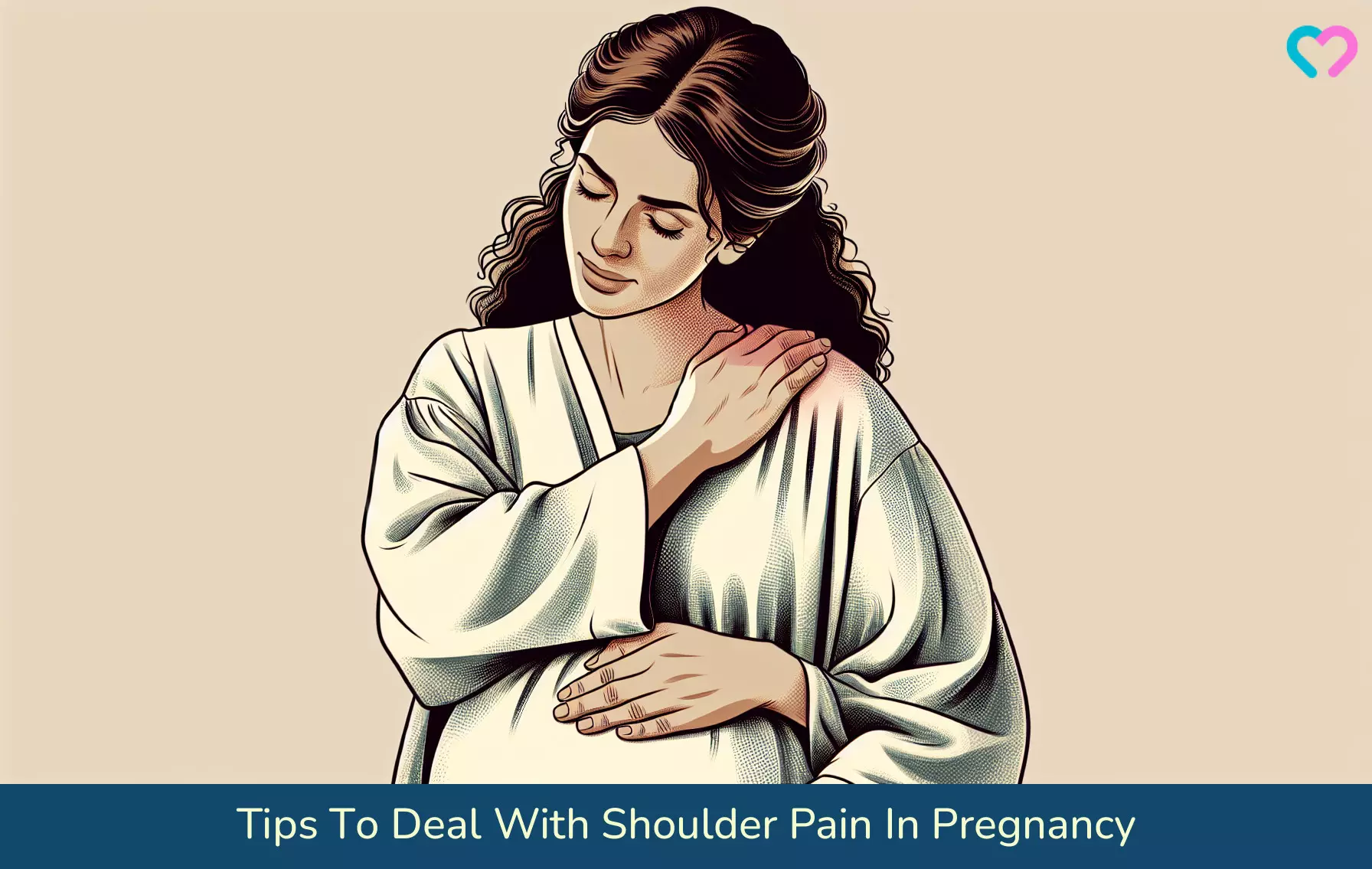
Image: Dall·E/MomJunction Design Team
Pregnancy-related changes in the body can lead to pain around the shoulder, hips, back, and joints. But staying active and doing some safe stretches can help you get pain relief. Watch this video to learn simple, easy-to-follow stretches.
References
- Karoline B. Seglem et.al; (2017); Pre-pregnancy mental distress and musculoskeletal pain and sickness absence during pregnancy – a twin cohort study.
https://academic.oup.com/eurpub/article/27/3/477/2975332 - Anthony Corvese; (1924); Shoulder Pain as an Indication of Ruptured Ectopic Pregnancy.
https://www.nejm.org/doi/pdf/10.1056/NEJM192412111912404 - Symptoms-Ectopic pregnancy.
https://www.nhs.uk/conditions/ectopic-pregnancy/symptoms/ - Ectopic Pregnancy.
https://uhs.berkeley.edu/sites/default/files/ectopicpregnancy.pdf - Rebecca Conder et.al; (2019); The Biomechanics of Pregnancy: A Systematic Review.
https://pmc.ncbi.nlm.nih.gov/articles/PMC7739277/ - What to do about gallstones.
https://www.health.harvard.edu/womens-health/what-to-do-about-gallstones - Martti Rechardt et.al; (2010); Lifestyle and metabolic factors in relation to shoulder pain and rotator cuff tendinitis: A population-based study.
https://pmc.ncbi.nlm.nih.gov/articles/PMC3161397/ - Say “good night” to neck pain.
https://www.health.harvard.edu/pain/say-good-night-to-neck-pain - Preeclampsia-SIGNS & SYMPTOMS.
https://www.preeclampsia.org/signs-and-symptoms - Preeclampsia: Be aware of this silent condition during pregnancy.
https://www.eehealth.org/blog/2019/06/preeclampsia/ - Preeclampsia Genomics and Public Health.
https://blogs.cdc.gov/genomics/2025/10/25/preeclampsia/ - Umar Sadat et.al; (2008); Splenic artery aneurysms in pregnancy – A systematic review.
https://www.sciencedirect.com/science/article/pii/S1743919107001318 - Brachial Neuritis.
https://www.ncbi.nlm.nih.gov/books/NBK499842/ - Peptic Ulcer Disease.
https://www.msdmanuals.com/home/digestive-disorders/gastritis-and-peptic-ulcer-disease/peptic-ulcer-disease - Charly Gaul et.al; (2025); Impact of the Neck and/or Shoulder Pain on Self-reported Headache Treatment Responses – Results From a Pharmacy-Based Patient Survey.
https://pmc.ncbi.nlm.nih.gov/articles/PMC9339896/ - Referred Shoulder Pain.
https://www.uofmhealth.org/health-library/aa58029 - Shoulder pain.
https://www.nhs.uk/conditions/shoulder-pain/ - Shoulder Pain.
https://shcs.ucdavis.edu/health-topic/shoulder-pain - Shoulder pain.
https://www.betterhealth.vic.gov.au/health/conditionsandtreatments/Shoulder-pain - Medication for Frozen Shoulder.
https://nyulangone.org/conditions/frozen-shoulder/treatments/medication-for-frozen-shoulder - Low-Fat Diet for Gallbladder Disease: Care Instructions.
https://healthy.kaiserpermanente.org/health-wellness/health-encyclopedia/he.low-fat-diet-for-gallbladder-disease-care-instructions.uh4542 - Everything You Need to Know About Massage Therapy.
https://health.clevelandclinic.org/benefits-of-massage - Ghazala Langah et.al; (2025); Effectiveness of Antenatal Exercises Program for the Management of Neck and Shoulder Pain.
https://jhrlmc.com/index.php/home/article/view/416 - Keaton Ott et.al; (2025); Postprandial Referred Shoulder Pain: A Case Report.
https://pmc.ncbi.nlm.nih.gov/articles/PMC9246054/ - Shoulder pain.
https://www2.hse.ie/conditions/shoulder-pain/ - Danielle G TSEVAT et.al; (2017); Sexually Transmitted Diseases and Infertility.
https://pmc.ncbi.nlm.nih.gov/articles/PMC5193130/ - Andrew W Horne et.al; (2014); The Association between Smoking and Ectopic Pregnancy: Why Nicotine Is BAD for Your Fallopian Tube.
https://pmc.ncbi.nlm.nih.gov/articles/PMC3930728/ - Complementary therapy during pregnancy.
https://www.pregnancybirthbaby.org.au/complementary-therapy-during-pregnancy - Treating Sports Injuries with Ice and Heat.
https://www.healthychildren.org/English/health-issues/injuries-emergencies/sports-injuries/Pages/Treating-Sports-Injuries-with-Ice-and-Heat.aspx - Carpal tunnel syndrome and pregnancy.
https://www.pregnancybirthbaby.org.au/carpal-tunnel-syndrome-and-pregnancy - Shalini Shah et.al; (2015); Pain Management in Pregnancy: Multimodal Approaches.
https://pmc.ncbi.nlm.nih.gov/articles/PMC4584042/
Community Experiences
Join the conversation and become a part of our nurturing community! Share your stories, experiences, and insights to connect with fellow parents.
Read full bio of Dr. Vimee Bindra
- Dr. Alan Lindemann is an obstetrician and maternal mortality expert, who worked as a clinical associate professor at the University of ND. An alumnus of the University of ND and the University of Minnesota, he is a member of the American College of Obstetricians and Gynecologists and the American Medical Association.
 Dr. Alan Lindemann is an obstetrician and maternal mortality expert, who worked as a clinical associate professor at the University of ND. An alumnus of the University of ND and the University of Minnesota, he is a member of the American College of Obstetricians and Gynecologists and the American Medical Association.
Dr. Alan Lindemann is an obstetrician and maternal mortality expert, who worked as a clinical associate professor at the University of ND. An alumnus of the University of ND and the University of Minnesota, he is a member of the American College of Obstetricians and Gynecologists and the American Medical Association.
Read full bio of Rebecca Malachi
Read full bio of Swati Patwal
Read full bio of Dr. Joyani Das











